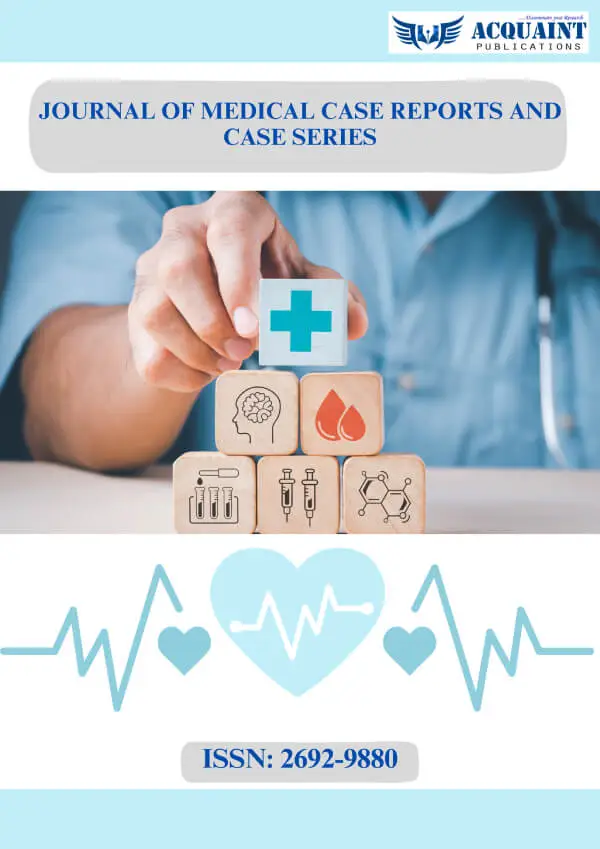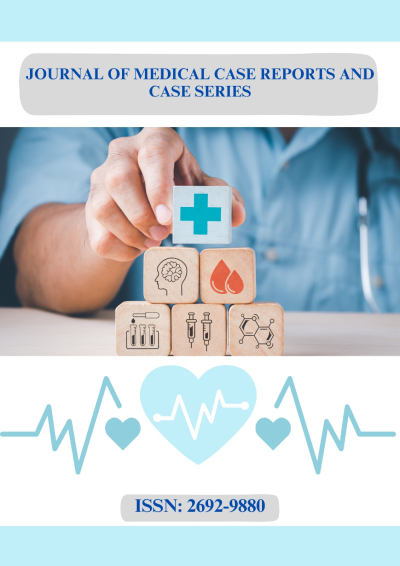Mert Dogan M.D1*, Mehmet Yasir Pektezel M.D2
1Hacettepe University Faculty of Medicine, Department of Cardiology, Ankara, Turkey
2Kahramanmaraş Necip Fazil City Hospital Department of Neurology – Neurocritical Care, Kahramanmaras, Turkey
*Corresponding Author: Mert Dogan M.D, Hacettepe University Faculty of Medicine, Department of Cardiology, Ankara, Turkey.
Introduction
Rheumatoid arthritis (RA) is an autoimmune systemic inflammatory disease seldomly affecting the central nervous system [1]. Incontinence secondary to neurologic involvement is one of the uncommon presentations of RA, the vast majority occurring due to atlantoaxial joint involvement [2]. However, in addition to neurologic manifestations occurring due to compressive complications affecting the medulla spinalis [2], meningeal involvement should also be considered an exceptional cause. We aimed to highlight a patient with incontinence due to bilateral frontal leptomeningeal involvement secondary to RA in whom lesions improved after a rituximab treatment, however, complicated by COVID-19 pneumonia.
Case Presentation
A 61-year-old woman with RA was admitted to our Medical Intensive Care Unit (ICU) after being diagnosed with COVID-19 pneumonia and stool incontinence. On admission, her vital signs were within normal limits other than tachypnea. Favipiravir 200 mg BID followed by an 800 mg BID loading dose was commenced, and her usual 8 mg per oral prednisolone treatment was increased to 1 mg/kg. Her medications for RA, leflunomide 20 mg QD, hydroxychloroquine 200 mg QD, and sulfasalazine 1000 mg BID, were also discontinued. In history, it was revealed that her incontinence had been present for the three weeks before admission, at which point the patient was treated with intravenous pulse methylprednisolone 1000 mg QD for 3 days and 1000 mg of intravenous rituximab for leptomeningeal contrast-enhancing lesions on magnetic resonance imaging (MRI) those involving frontal parasagittal area at the vertex level while spinal cord investigation was routine (Figure 1. a).
The neurological examination has found no abnormality besides increased deep tendon reflexes and withdrawing plantar responses.
A lumbar puncture after MRI was performed, and cerebrospinal fluid (CSF) examination revealed normal biochemistry and no microorganisms were grown in cultures. We could not detect any antibodies that could be significant for the presence of any latent or active infections. CSF cytology was also normal. A pudendal electro-neuro-myographic (EMG) examination for incontinence showed neither abnormal values on nerve conductions nor pathologic signs on anal needle EMG. The whole work-up led us to consider contrast-enhancing lesions being a presentation due to RA.
Her oxygen support decreased on follow-up without any deterioration at the neurologic examination. The course of COVID-19 pneumonia was uneventful. A control MRI revealed that frontal contrast-enhanced lesions drastically reduced. (Figure 1. b).

Figure 1a. FLAIR (top) and contrast-enhanced (bottom) images at first MRI revealing bilateral frontal leptomeningeal involvement at vertex.
Figure 1b. Decreased involvement in MRI (obtained after 8 weeks) lesions at FLAIR (top) and contrast enhanced (bottom) images.
Discussion
Herein we presented an exceptional cause of incontinence that developed secondary to an insidious onset of frontal leptomeningeal involvement, which is related to RA in a patient who has been admitted to our medical ICU for COVID-19 pneumonia.
Neoplasm, infection, neurosarcoidosis, idiopathic hypertrophic pachymeningitis, and IgG4-related meningeal disease are included in the differential diagnosis of leptomeningeal involvement in a patient with RA[3]. Apart from those, more exceptionally, anti-TNF inhibitors might result in a paradoxical development of rheumatoid nodules, which should be settled in the meninges[4-6]. Although the gold standard for a precise diagnosis is a biopsy, normal CSF and serum IgG4 levels, no history of anti-TNF inhibitor use, and MRI lesions which regressed after immune-modulatory treatment has led us to consider leptomeningeal involvement secondary to RA to be the only cause explaining the whole picture.
Corticosteroids remain the mainstay of therapy in patients with RA exacerbation [4-6].
In addition to corticosteroids, immunosuppressive agents such as methotrexate, cyclophosphamide, or rituximab has to be scheduled individually for maintenance therapy [4-6]. However, it should be kept in mind that B cell-depleting therapies have the potential to adversely affect COVID-19 course and outcomes[8], as occurred in our case. Neurologic manifestations in RA generally include seizures [9], extrapyramidal symptoms[9], stroke-like episodes[10], and neuropsychiatric disorders[11]. Subacute onset of stool incontinence related to RA is exceptional. Therefore, we found the current case valuable to be presented. We recommend leptomeningeal involvement be kept in mind in patients with RA with insidious onset of incontinence.
References
- Trabelsi M, Romand X, Gilson M, Vaillant M, Guerne PA, et al. (2020) Rheumatoid Meningitis a Rare Extra-Articular Manifestation of Rheumatoid Arthritis: Report of 6 Cases and Literature Review. J Clin Med. 9(6): 1625.
- Janssen I, Nouri A, Tessitore E, Meyer B (2020) Cervical Myelopathy in Patients Suffering from Rheumatoid Arthritis-A Case Series of 9 Patients and A Review of the Literature. J Clin Med. 9(3): 811.
- Bruggemann N, Gottschalk S, Holl-Ulrich K, Stewen J, Heide W, et al. (2010) Cranial pachymeningitis: a rare neurological syndrome with heterogeneous aetiology. J Neurol Neurosurg Psychiatry. 81(3): 294-8.
- Nesbitt C, Willshire L, Quan D, Shaw C, Batchelor P (2015) Leptomeningeal rheumatoid nodules: diagnosis and failed therapeutics. J Clin Neurosci. 22(2): 425-8.
- Cavazzana I, Taraborelli M, Fredi M, Tincani A, Franceschini F (2014) Aseptic meningitis occurring during anti-TNF-alpha therapy in rheumatoid arthritis and ankylosing spondylitis. Clin Exp Rheumatol. 32(5): 732-4.
- Tsuzaki K, Nakamura T, Okumura H, Tachibana N, Hamano T (2017) Rheumatoid Meningitis Occurring during Etanercept Treatment. Case Rep Neurol Med. 2017: 7638539.
- Joshi S, Masiak A, Zdrojewski Z (2020) Rheumatoid arthritis with pachymeningitis - a case presentation and review of the literature. Reumatologia. 58(2): 116-22.
- Leipe J, Wilke EL, Ebert MP, Teufel A, Reindl W (2020) Long, relapsing, and atypical symptomatic course of COVID-19 in a B- cell-depleted patient after rituximab. Semin Arthritis Rheum. 50(5): 1087-8.
- Pellerin D, Wodkowski M, Guiot MC, AlDhukair H, Blotsky A, et al. (2019) Rheumatoid Meningitis Presenting With Acute Parkinsonism and Protracted Non-convulsive Seizures: An Unusual Case Presentation and Review of Treatment Strategies. Front Neurol. 10: 163.
- Schuster S, Braass H, Iking-Konert C, Iking-Konert C, Schnoor U, et al. (2018) Rheumatoid meningitis: A rare cause of aseptic meningitis with frequently stroke-like episodes. Neurol Clin Pract. 8(5): 451-5.
- Lubomski M, Sy J, Buckland M, Lee AS, Richards B, et al. (2019) Rheumatoid leptomeningitis presenting with an acute neuropsychiatric disorder. Pract Neurol. 19(1): 68-71.



